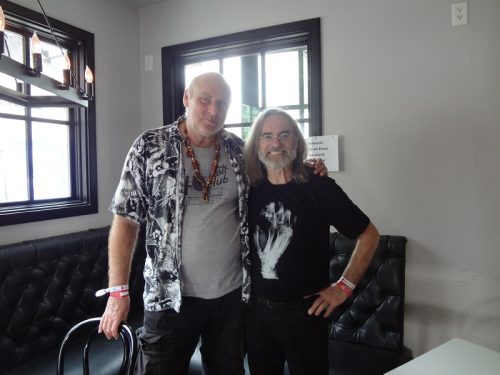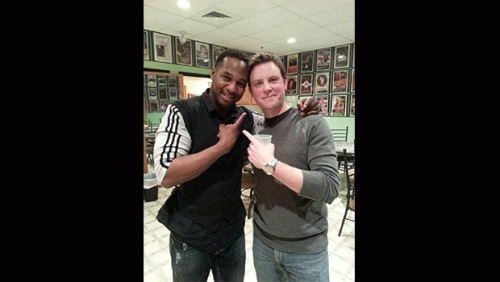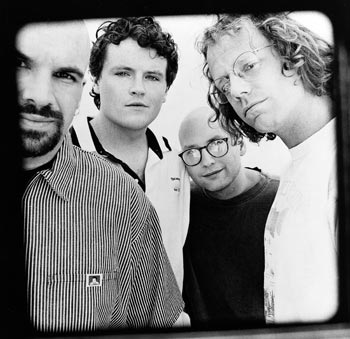The enigmatic German band Faust arose from Germany’s wildly fertile music scene of the late ‘60s and early ‘70s. Abrasive and challenging, the band foreshadowed the rise of industrial and electronic music. But it also had a wistful, quirky, even humorous side. How else do you explain song titles like “The Sad Skinhead”?
Alongside contemporaries like Can and Tangerine Dream, Faust was grouped under the banner of “Krautrock.” (Mind you, the artists themselves often rejected the label. Koscmische musik is an alternative term.) As journalist Ritchie Unterberger wrote in “Unknown Legends of Rock and Roll”: “It was as if Star Trek’s mission to explore strange new worlds had been hijacked entirely by Vulcans.”
Faust reunited in the 1990s and continues to make music today. Most recently, the band toured the United States in 2016. I interviewed band members Jean-Herve Peron and Zappi Diermaier in Austin, Texas.
I understand, Jean-Herve, that you’re French and Zappi’s Austrian. How did you end up in Hamburg?
Jean-Herve Peron: You must know that it was in the end of the ‘60s. There was a lot of movement in Europe. The young people were traveling from Italy to Germany, France to Italy. Europe was in a huge upheaval, politically and socially. Everything was moving. Zappi left Austria to come to Hamburg. I left France following a German young beautiful lady. I landed in Hamburg. This is where we met.
You recorded your early music in isolation. Do you think that was good thing that helped your music? How do you think it affected the music you made?
JHP: “Isolation” is a very strong word. When you are out [in] the influence of the outer world, like TV, newspapers, bars, cinema, people walking around, you are distracted. You are not concentrating. You are alone in isolation, you go deeper into your own self. It helped a lot. It had a strong influence on our music, because we were introverted. We were deeper into ourselves.
I’m wondering how you felt about the label “Krautrock.” I mean you guys are not even German. And the only thing that bands like you had in common was that you were recording in Germany. Were you comfortable with that label?
Zappi Diermaier: I don’t like the word Krautrock, because I don’t know really what Krautrock is. I think it is a name from the music industry, the word “Krautrock.” It means “rock music from Germany.” But it’s not true.
JHP: It would be wrong to say it was from Germany. This was a European movement. Of course it happened in Germany a lot, but it was all over Europe. And don’t forget the word “Kraut” is not very nice. I understand on the other hand that 1939 to 1945, Germany wasn’t nice to the world either. But we don’t like it. We don’t like the word.
But you also recorded a song called “Krautrock.” Could you tell me about that?
JHP: We were trying to show that also the Germans can have humor. So if you say we make Krautrock, so we play a song and we call it “Krautrock”!
You talk about a European sound and I think it’s interesting it came about a generation, a few generations after Europe was at war. There were two wars in Europe. Why do you think that happened?
JHP: I think it’s a question of money. It’s a question of economics. That’s the only reason to have war. I don’t think the people, the soldiers, they don’t want war. I think it’s more economics. War is more economics.
What do you think happened after the war when you saw the European sound and European musicians coming together and playing?
JHP: Where there is a vacuum, nature doesn’t like vacuums. So in Europe, there was obviously, after the Second World War, after those two wars, there was a vacuum. They call it sometimes. . .”Hour Zero.” There was nothing more in Europe, everything was bombed, destroyed, killed, so nature doesn’t like vacuum. And we filled it with something new. And they called it Krautrock.
You have toured with Sonic Youth. What was that like?
JHP: It was 1994, and they were touring with us on a showcase called “Table of the Elements.” They invited a lot of interesting people, like AMM, like . . . Thurston Moore, and Sonic Youth and Gate and Barbara Manning. And Faust was there. How was it to play with them? It was extremely inspiring, because all of those people shared common ideas: Freedom. Freedom of expression . . . In different ways, we expressed this feeling in different ways. But we were exactly on the same wavelength.
When you started recording together again as Faust, what was it like to make music using newer technology?
JHP: At the beginning, when something new, when you encounter something new, it’s quite normal to have a reflex of saying, “No, we don’t want this. We played music analog before, so why should we go with digital?” It took quite a few years until I realized how interesting it is to use the digital world. You can go very precisely instead of slicing tape and take the risk of losing the music you had. You can digitally very precisely manipulate, perfectionate, you know, you can work on your music. You know, it’s like microsurgery. And also all those samples, field recordings, are very easy to use. You just press a button, bang! You’ve got a sound of anything you want, at the touch of your finger Immediately.
There’s one aspect of your music that I think people overlook. That one the one hand you sometimes make very abrasive songs but also very melodic songs. I’m thinking about the song “Flashback Caruso,” for instance [from “The Faust Tapes”].
JHP: We had a mixture of the romantic and the brutal. It’s a mixture of brutal music and romantic soft music. A mixture of confusion, extreme, a lot, lot a lot, and on the other end, minimalism. All this is in our music. We don’t ignore any aspect. Maybe that’s why . . . one element that makes it interesting.
And you always seem to have had a sense of humor, like with the song “Krautrock,” that I think people sometimes miss.
JHP: Well, thank you for saying so….On the one hand we take our art very seriously, that’s for sure. But on the other end. . .there is nothing serious about music. Nothing serious about art. It is a game. But it is as serious as children are when they play.




Leave a Reply